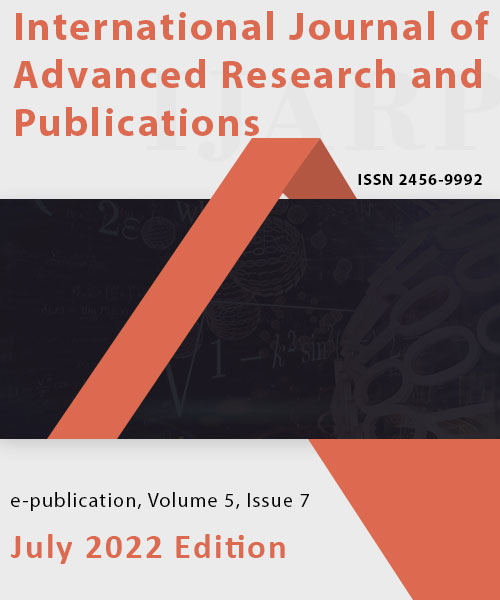Knowledge, Attitude, And Acceptance Of Senior Citizens On Covid-19 Vaccinations
 Volume 5 - Issue 7, July 2022 Edition
Volume 5 - Issue 7, July 2022 Edition
[Download Full Paper]
Author(s)
Roberto F. Mangsat, Christopher R. Banez
Keywords
COVID-19 vaccination, knowledge, attitude, acceptance, promotion
Abstract
The COVID-19 Vaccine deployment program is dependent on the global vaccine supply available for the Philippines, and senior citizens are eligible and categorized under first group priority; it is a good start. However, vaccination challenges are still evident during the vaccine rollouts. Thus, this descriptive study determined the knowledge, attitude, and acceptance of senior citizens of COVID-19 Vaccinations. Most respondents of this descriptive study are males and married, already in the late adulthood stage, high school graduates, and have comorbidities, particularly diabetes and hypertension. Pfizer is their most preferred vaccine brand. However, they need more information, and they have an average attitude and average level of acceptance. Younger respondents are knowledgeable, female respondents have a significantly more positive attitude toward COVID-19 vaccinations, and males accept the vaccine more. Senior citizens with higher educational attainment have a higher level of knowledge on COVID-19 vaccinations. Despite being classified as a priory group, those who could not come to the vaccination sites should be vaccinated in their respective houses and based on their preferred vaccines. There should be an enhancement in program innovations related to non-communicable diseases to further cater to their medical needs and more efforts on health education and promotion or advocacies on COVID-19 vaccines in local dialects. Support groups or associations and family members should also participate in promotive activities. Moreover, the proposed "PRIORITY" program should be adopted to help increase the accomplishments in line with the guidelines provided by the DOH, particularly on the COVID-19 vaccination, among others.
References
[1] Amin Mirzaaei, F.Kazembeigi, H. Kakaie, Mohnsen Jalilian, S. Mazloom Nourmoradi (2021),: Application of Health belief model to predict C Covid 19 preventive behaviors among a sample of Iranian adult Population.2(5): https://www.jehp.net/article.asp?issn=22779531;year=2021;volume=10;issue=1;spage=69;epage=69;aulast=Mirzaei
[2] Buttler, Rob (2015), “Vaccine Hesitancy: What it means and what we need to know in order to tackle it†Journal of Vaccine, 41(3),2-11 https://www.who.int/immunization/research/forums_and_initiatives/RButler_VH_Threat_Child_Health_gvirf16.pdf
[3] Cordina M, Lauri MA, Lauri J. Attitudes towards COVID-19 vaccination, vaccine hesitancy and intention to take the vaccine. Pharm Pract (Granada). 2021 Jan-Mar;19(1):2317. DOI: 10.18549/PharmPract.2021.1.2317. Epub 2021 Mar 22. PMID: 33828623; PMCID: PMC8005329.
[4] Department of Health, The Philippine National COVID-19 Vaccination Deployment Plan 2021. https://doh.gov.ph/sites/default/files/health-update/IATF-RESO.pdf
[5] Ferdous MZ, Islam MS, Sikder MT, Mosaddek ASM, Zegarra-Valdivia J JA Gozal, D. Knowledge, attitude, and practice regarding COVID-19 outbreak in Bangladesh(2020), an online-based cross-sectional study. Plus One. 15(10), e0239254.. https://doi.org/10.1371/journal.pone.0239254.
[6] Huoba Li, Lulu Cheng, Juan Tao, Deyu Chen & Chenchen Zeng (2022) Knowledge and willingness to receive a COVID-19 vaccine: a survey from Anhui Province China, Human Vaccines & Immunotherapeutics, 18:1, DOI:10.1080/21645515.2021.2024064
[7] Islam, M. S., Siddique, A. B., Akter, R., Tasnim, R., Sujan, M. S. H., Ward, P. R., & Sikder, M. T. (2021): Knowledge, attitudes, and perceptions towards COVID-19 vaccinations: a cross-sectional community survey in Bangladesh, 10:25. htttps://doi.org/10.1101/2021.02.16.21251802
[8] Kumar D, Chandra R, Mathur M, Samdariya S, Kapoor N. 2016: V Vaccine hesitancy: understanding better to address better. Israel J Health Policy Res, 5(1) https://doi.org/10.1186/s13584-016-0062-y.
[9] Lazarus JV, Ratzan SC, Palayew A (2021),: A global survey of potential acceptance of a COVID-19 vaccine. Nat Med. 27,225–8. https://doi.org/10.1038/s41591-020-1124-9.
[10] Malik AA, McFadden SM, Elharake J, Omer SB (2020): Determinants of COVID-19 vaccine acceptance in the US. EClinicalMed.26:100495. https://doi. org/10.1016/j.eclinm.2020.100495.
[11] Paterson P, Meurice F, Stanberry LR, Glismann S, Rosenthal SL, L Larson HJ (2016): Vaccine hesitancy and healthcare providers.Vaccine.34(52):6700–https://doi.org/10.1016/j.vaccine.2016.10.042.
[12] Zampetakis, L.A.; Melas, C.(2021) The health belief model predicts vaccination intentions against COVID-19: A survey experiment approach,13(2),469-484 Appl. Psychol. Health Well-Being 2021. [ CrossRef] [PubMed]
[13] YS. Gender difference in physical activity and walking among older adults. J Women Aging. 2005;17(1-2):55-70. DOI: 10.1300/J074v17n01_05. PMID: 15914419.